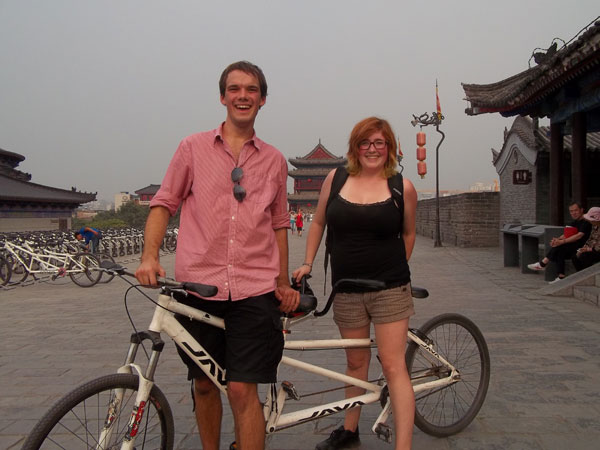US students share love of Mandarin
By HUA SHENGDUN in Washington (China Daily USA) Updated: 2015-03-20 10:30
 |
|
Daniel Reinemann (left), a senior student at the George Washington University, is ridding a bike with his friend on the Old City Wall in Xi'an in 2014 when he took an exchange program at the Shaanxi Normal University during the fall semester. Provided to China Daily |
When the Chinese president and the Harvard president met in Beijing this week and called for deeper understanding through cultural and educational exchanges, it resonated with a Chinese language group for American college students in Washington.
The Chinese tea time, a regular event for Mandarin speaking and bicultural sharing, kicked off this semester at the George Washington University Sigur Center for Asian Studies on Tuesday afternoon.
Daniel Reinemann, a senior majoring in international relations at GWU, went to Shaanxi Normal University in Xi'an as an exchange student in the fall of 2014.
Reinemann said he was immersed in Chinese life and made a lot of friends.
"We played rugby on the campus and also invited them (the other students) to join in," he said.
Reinemann took a trip with 15 American students in late October to several ancient cities in Northwest China, including Lanzhou, Urumchi, Dunhuang and Kashi Prefecture, in a salute to the Chinese Silk Road, the network of trade and cultural routes across the Asian continent that flowed from China since the days of the Han Dynasty 1,000 years ago.
"An interesting experience," Reinemann said in Mandarin. He has studied Chinese for three years as his minor. "A lot of people learn Chinese for practical reasons, but I think the cultural aspects are also important and attractive," he said.
Mark Jarvis, who graduated from GWU more than 20 years ago, returned to the school's Confucius Institute to further his study in China after retirement.
"I used to do some business in Asia and went to Shanghai, Beijing and Hong Kong very often," Jarvis said. "It's very useful."
Liu Hongzhong, a professor at the Liaoning University School of International Studies and now the school's visiting scholar, led the gathering by discussing Chinese contemporary economy and policy bilingually.
"The seminar aims to be an introduction and discussion about the latest topics and issues in China to let American students know China in a deep and comprehensive sense," Liu said.
Both Reinenmann and Jarvis are among the growing number of American students who have taken to the Chinese language and culture in the past decade, particularly after US President Barack Obama announced in Shanghai in 2009 a goal of sending 100,000 American students to study in China from 2010 to 2014.
The 100,000 Strong Initiative was formally launched in Beijing in May 2010 by then-Secretary of State Hillary Clinton.
China is now the fifth destination for Americans studying abroad, after Britain, Italy, Spain and France, according to the 2014 Open Doors report by the Institute of International Education.
In the 2012-13 academic year, the number of US students in China taking classes for credit has jumped to more than 14,000 from about 3,000 in the year 2000. That figure does not include an estimated 10,000 American students who went to China for non-credit and short-term language and volunteer programs each year.
Zhang Yan, a graduate student at the Beijing-based Tsinghua University School of Journalism and Communication, told China Daily that the Chinese language has become a stepping stone among US college students.
In 2011, Zhang spent a semester at the University of Rhode Island as an exchange student. After class, she also assisted in teaching Chinese language classes 10 hours a week at the university's Confucius Institute.
"Many finance and management major students chose specifically to learn Chinese," said Zhang, who also helped hold Chinese cultural events in local communities around the state. "They thought the Chinese-language skill could back up the future career."
During Harvard President Drew Gilpin Faust's visit to Beijing on Monday, Chinese President Xi Jinping called the mutual people-to-people exchanges a "key pillar of the China-US relationship in the new era" and expected "closer ties between the nations' universities".
Faust, Harvard University's first female president, said that China-US cooperation in education has played a role in improving public understanding and in the development of the bilateral relationship.
In her speech at Tsinghua on Tuesday, she said educating the next generation of leaders is an issue of "deep mutual interest".
"It is through continuous dialogue and exchanges of information and views that we can make progress on the issues that are important to our university, to the people of China, and to the world," she said.
Sheng Yang in Washington contributed to this story.






